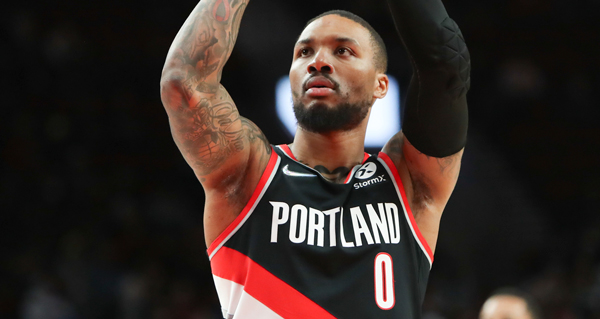If football drapes itself in martial gravitas and baseball gives major Mike Pence can still do the right thing energy, basketball is governed by fear. Modern offenses are built to fray the nerves of opponents by placing off-ball defenders in moments of sudden panic; Woj and Shams and the other Scoopsters have turned FOMO into the dominant mode of media. Like the protagonist of a Bruce Springsteen song or someone with an Android, the NBA’s various paranoiacs and try-hards are haunted by the feeling that a bigger, better world has passed them by.
This is the text and subtext of every aspect of the NBA. Teams, executives and fans are afraid that the whims of a flighty star can doom them to decades of irrelevancy. Players fear that their short careers will be frittered away by unambitious teams, so they force their way into places where they think they can win—or, at least, where they can most thoroughly enjoy being young and rich. Even for someone as performatively Boomer-pilled as Damian Lillard, being beloved in Portland ultimately yields to the fear of becoming a meme everywhere else.
And so, in this town full of losers, Damian Lillard is pulling out of here to win.
As part of Wednesday’s seismic three-way trade, the Trail Blazers shipped Damian Lillard to the Milwaukee Bucks in exchange for Jrue Holiday and an assortment of far-off draft picks (as well as DeAndre Ayton from the Suns). This is shocking—and not merely because Lillard and the Miami Heat spent the last several months making googly eyes at each other. But, from a macroeconomic perspective, it was inevitable: the Bucks traded for Lillard because they had no other option.
Although the Bucks are just two years removed from a championship and have won a league-best 69 percent of their games over the last five seasons, they’ve always nursed one secret flaw: they weren’t that great. If last year’s epic first round crap-out to the Heat didn’t quite signify the end times, it signified the end of good times. Years of rote, heliocentric ball had rendered them a gas giant, their inner emptiness hidden beneath puffs of hot air. Continuity became staleness and experience curdled into oldness, as Khris Middleton, Brook Lopez, and the now-departed Jrue Holiday crept into their mid-30s.
Worse, Giannis Antetokounmpo openly flirted with demanding a trade, threatening to leave if the Bucks didn't give him a good reason to stay.
Whereas legacy teams like the Heat are given the privileges of time and patience, the Milwaukees (and Portlands) of the world need to continuously prove their worthiness. Superstars force their way to Miami; Milwaukee is a place you leave. The mere prospect of non-contention was enough to make Antetokounmpo antsy—and potentially drive him right into Miami’s expecting arms. The Bucks, like nearly every other franchise in a city without a Michelin star, exist under a cruel tautology: the only way to succeed is to never fail.
As such, the Bucks traded away Holiday and broke up a 58-win team because they were desperate in ways that Miami was not and never will be. Despite failing to land Lillard, the Heat are fine because there will always be another Lillard; the Bucks pulled the trigger because there will never be another Antetokounmpo. The Heat felt like they deserved Lillard; the Bucks acted like they needed him.
By acquiring Lillard, the Bucks have presumably squelched Antetokounmpo’s immediate wanderlust. More, they’ve established themselves as the consensus favorite to come out of the East to reach The Finals. While Holiday is an All-NBA caliber guard in his own right, he’s limited—and limiting—in ways that Lillard is not. For the last three seasons, Milwaukee’s offense consistently went belly up in the playoffs because Holiday’s piddling shooting allowed defenses to turn every Antetokounmpo paint touch into a one-on-five Oklahoma drill.
Conversely, Lillard instantly remedies the Bucks’ sludgy offense by dint of being one of the most dangerous scorers in basketball history. His incandescent shooting poses an unsolvable math problem: there’s no way to account for both Lillard’s three-point shooting and Antetokounmpo’s interior scoring with just five players. Defenses will be powerless against any and all iterations of a Lillard-Antetokounmpo pick-and-roll—the only way to stop it would be by court decree.
Still, there’s no guarantee that even another championship would keep Antetokounmpo in Milwaukee. By the time Antetokounmpo’s contract expires in 2026, Lillard will be nearly 36 years old, and Middleton and Lopez will have aged out of usefulness. In this sense adding Lillard is the natural culmination of the Bucks’ half decade of charging full speed ahead, torpedoes be damned. Way back in 2019, they swapped draft picks for Eric Bledsoe, who was then packaged with even more draft picks for Jrue Holiday in 2020, who has now been packaged with even more draft picks for Lillard. The Bucks will be the best team until they become the worst.
And that’s fine with them. The Bucks’ deal evinces the same anxious logic as Minnesota’s move for Rudy Gobert, or Cleveland’s eleventh-hour decision to yoink Donovan Mitchell out from the Knicks' noses last summer. The Heat and Knicks can try to scare off other bidders and turn trade negotiations into protracted, hostile takeovers, but ambitious small market teams must occupy a different valence of urgency. When your precious home-grown star is merely a slushy morning commute and one losing streak away from becoming a flight risk, you’d better win. Together, these deals represent team-building via desperate, frantic Boy Math. Is there really any harm in borrowing against your future when the alternative is having no future?



